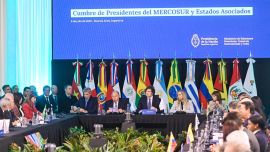Christine Lagarde has defended the International Monetary Fund’s (IMF) decision to give Argentina a record credit line last year, even after the US$56-billion programme fell short of stabilising the nation’s troubled economy.
“We did the best we could at the time when Argentine leaders came to us with a very difficult situation,” the former IMF managing director and soon-to-be European Central Bank chief told Francine Lacqua, in an interview with Bloomberg Television in New York.
President Mauricio Macri sought IMF support in May 2018, when a currency crisis threatened the market-friendly reforms he introduced after 12 years of protectionism under his predecessors. The unprecedented level of financial support was notable since many Argentines still blame IMF policies for leading to the country’s 2001 economic crisis.
Despite the Fund’s efforts this time, Argentina’s economy never found solid footing. Data showing it was finally emerging from recession quickly became obsolete after Macri’s shocking defeat in a August 11 primary vote sent local markets tumbling. Poverty, unemployment and inflation continue rising and Argentines are now bracing for a third year of economic contraction.
Scapegoat
Lagarde says the IMF is often unfairly blamed when things go awry.
“This is the fate of the institution, to be the scapegoat when things go wrong,” she said. “The IMF always gets a tough time whenever a programme is moderately successful or not successful, and it is never mentioned when a programme is superbly successful.”
The French lawyer said the IMF deal was accomplishing its goals of reducing external vulnerabilities and the fiscal deficit before things went off the rails due to a “political development.”
She underscored that provisions were in place to shield those most vulnerable from the pains of austerity.
“We had anticipated that it would hurt,” she said, adding that the deal included instruments “that could actually be activated in order to increase safety measures for the most vulnerable people.”
The IMF continues to engage with Argentine officials, the Fund’s Acting Managing Director David Lipton said in a statement on Tuesday, after meeting Macri in New York. He added that the government’s recent measures “have helped calm the markets.”
by Patrick Gillespie, Bloomberg




















Comments